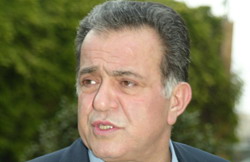 Lebanon Deputy Speaker Farid Makari told An-Nahar newspaper in remarks published on Wednesday that he disagrees with Speaker Nabih Berri’s announcement in which he pledged prior approval of the decision on the electoral law by the Christian leaders and their representatives who meet in Bkirki last Sunday.
Lebanon Deputy Speaker Farid Makari told An-Nahar newspaper in remarks published on Wednesday that he disagrees with Speaker Nabih Berri’s announcement in which he pledged prior approval of the decision on the electoral law by the Christian leaders and their representatives who meet in Bkirki last Sunday.
“With all due respect they are not all the Christians and Berri and everyone knows that the majority of the Christians are independent and do not have anything to do with the four parties that met in Bkirki. ” Makari said
Makari criticized the draft electoral law of the so called “orthodox” gathering stressing that he rejects it as the deputy speaker and as a member of the parliament because such a law will tear apart the social fabric among the Lebanese in addition to being unconstitutional and illegal.
Similarly Lebanese President Michel Suleiman voiced on Tuesday his opposition to the adoption the Orthodox Gathering’s proposed law in the upcoming parliamentary elections, calling it “unconstitutional”.
Lebanon’s Cabinet approved last August a new electoral draft law that called for proportional representation and divided the country into 13 districts as follows: Beirut 2, south Lebanon 2, Bekaa 3, north Lebanon 3 , Mount Lebanon 3.
The new electoral law was approved by the majority of ministers, including the FPM ministers . However the ministers that representProgressive Socialist Party leader MP Walid Jumblatt’s bloc voted against it.
Even though the FPM ministers voted for the cabinet ‘s electoral law draft, FPM MPs Alain Aoun and Neemtallah Abi Nasr submitted another draft electoral law to the parliament . This is the so called “Greek Orthodox gathering proposal” which calls on each sect in Lebanon to vote only for its candidate in the elections based on one electoral district for the whole country .
March 14 Christian MPs Georges Adwan, Boutros Harb and Sami Gemayel submitted a draft electoral law based on 50 districts and winner take all majority to the Parliament’s General Secretariat last October
Jumblatt and his PSP MPs still favor the current 1960 winner take all electoral law.
Lebanon is set to hold new parliamentary elections around June 2013, but the country’s political circles are divided over the electoral law issue .
A Christian four-party panel on the electoral law agreed on Sunday to endorse the electoral law proposed by the so-called Orthodox Gathering, under which each sect would elect its own lawmakers, and all Lebanon will be one electoral district
The panel took its decision during a meeting held in Bkirki. The four-party panel comprises representatives from the Free Patriotic Movement, the Lebanese Forces, the Phalange Party and the Marada Movement.

Leave a Reply
You must be logged in to post a comment.